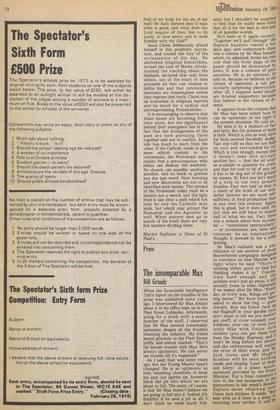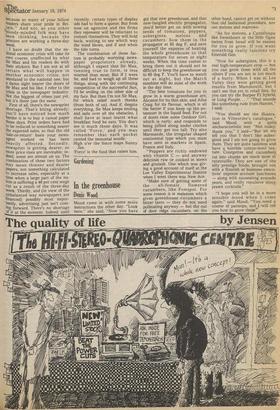Press
The incomparable Max
Bill Grundy
When the Economist Intelligence Unit's report on the troubles of the press was published some years ago, I interviewed Sir Max Aitken about it in his office high up in the Fleet Street Lubianka. Afterwards, going for a drink with a senior member of the staff, I observed that Sir Max seemed remarkably optimistic despite all the troubles besetting the industry. My friend stared gloomily at the Fleet Street traffic and almost snarled: "That's the bloody trouble with Max. He's always optimistic. He can never see trouble till it's happened."
As I said, that was some years ago, but the Young Master hasn't changed. He is as optimistic as ever, whistling cheerfully to keep his and our spirits up, however black the pit into which we are about to fall. The point, of course, is that Sir Max doesn't believe we are going to fall into it. Indeed, it's doubtful if he sees a pit at all. I don't think he reads much Vol.. taire, but I shouldn't be surprised to find that he really does think that all is for the best in this best of all possible worlds.
He's been at it again recently. "Together we'll pull through" the Express headline roared a feW days ago, and underneath there was a column by Sir Max himself, which, he admitted, broke his own rule that the front page of the paper should be dominated bY news. It was a column of pure sunshine. He is an optimist, he told us, because he believes in the virtues of optimism, a not particularly surprising observation. After all, I suppose some people are Arsenal supporters because they believe in the virtues of Arsenal.
It appears from the column that Sir Max has been asked how he can be optimistic in the light of the present situation. He told us.
He does it by a mixture of fact and faith. But the greatest of these is faith. Which is just as well, since his facts seemed decidedly dodgY. Fact one told us that we are built on coal and surrounded by oil. Which is true enough, except that it doesn't take into account another fact — that the oil won t be available in quantity for years. and that for coal to be of any use, it has to be dug out of the grounu by miners. So Fact one isn't much of a help in our very present troubles. Fact two told us that as a result of the work of our wonderful farmers we are more selfsufficient in food production than at any time this century. Again' this is great, but it does omit the fact that we still have to import half of what we eat. Fact three was a remark about how success:, ful — "sometimes spectacularlY or investments are, here and overseas. As an inspirational thought it seemed to me a trifle lacking. Sir Max's outburst was a con' tribution to yet another of those Beaverbrook campaigns designed to convince us that Hamlet vb's right when he said "There is nothing either good or bad but thinking makes it so." Concen: trate hard enough and th problem won't just go away, it wi" actually cease to exist. Especially if we repeat after Sir Max: "EverY day, in every way, things are getting better." We have even been asked to show the flag — quite literally. Run the Union Jack uP the flagstaff in your garden (ycli, don't mean to tell me you haven got one?), or cover yourself, Ynnr,.
windows, your car, or even ` lowly bike with Union Jac" stickers (you can get them free from the Sunday Express), and it won't be long before the miners and the railwaymen will realise the error of their ways, and
Jack Jones and Mr Hugh'' Scanlon will be seen holding
hands and singing 'Land of HOPe and Glory,' to a piano accorn' panirnent provided by the Pool Minister. For a final comment turn to the last paragraph of instructions in last week's Sunder Express about obtaining Ynut Union Jack stickers. It reads: "Bn. bear with us if there is a delay line receiving your sticker. It will b Spectator January 19, 1974
because so many of your fellow readers share your pride in Britain." And not, as you other 'bloody-minded folk may have been thinking, because the Printers are working a three-day week.
I have no doubt that the national economic crisis will take its ow. n course, unaffected by what Sir Max and his readers do with their stickers. But I am not at all certain what will happen in another economic crisis, not unrelated to the national one, but a. damn sight nearer the doors of Sir Max and his like. I refer to the crisis in the newspaper industry. Not the biggest of crises just yet, but it's there just the same. First of all, there's the newsprint Shortage. That's biting already; You'll have noticed how much harder it is to buy a casual paper these days. Print orders have had to be reduced to something nearer the expected sales, so that the old sale-or-return' basis your newsagent worked on has been heavily affected. Secondly, newsprint is getting dearer, so more price rises are inevitable; indeed, some are almost on us. The combination of these two factors 'nay mean thinner and dearer Papers, not something calculated to. increase sales, especially at a time when a large part of the nation is suffering a 40 per cent wage cut as a result of the three-day Week. Thirdly, and (in view of the unbalanced way newspapers are financed) possibly most importantly, advertising just isn't coming forward. There's no shortage of it at the moment. Indeed, until
recently, certain types of display ads had to form a queue. But from now on agencies and the firms they represent will be reluctant to commit themselves. They will hold back, waiting to see which way the wind blows, and if and when the tide turns.
The combination of these factors is probably worrying newspaper proprietors already, although I expect that Sir Max, running true to form, is less worried than most. But if I were he, and had to weigh up all these things, along with the continuing competition of the successful Sun, I'd be smiling on the other side of my face. But then I'm not Sir Max, for which relief much thanks (from both of us). And if, despite everything, Sir Max keeps smiling and sails over all the obstacles, I shall have at least learnt what breakfast food he eats. You don't see it much these days. It was called 'Force,' and you may remember that each packet carried the immortal words:
High o'er the fence leaps Sunny Jim.
'Force' is the food that raises him.



































 Previous page
Previous page